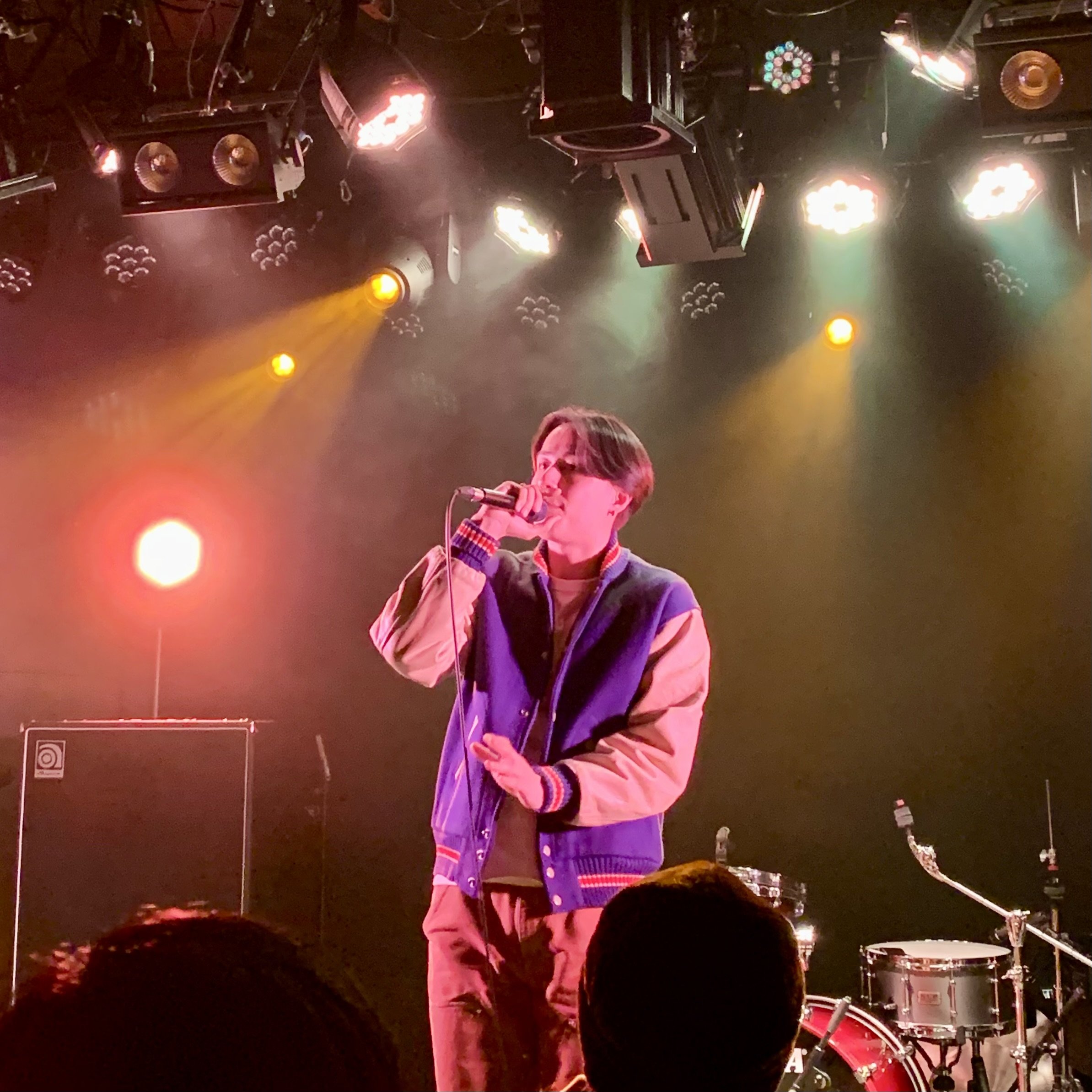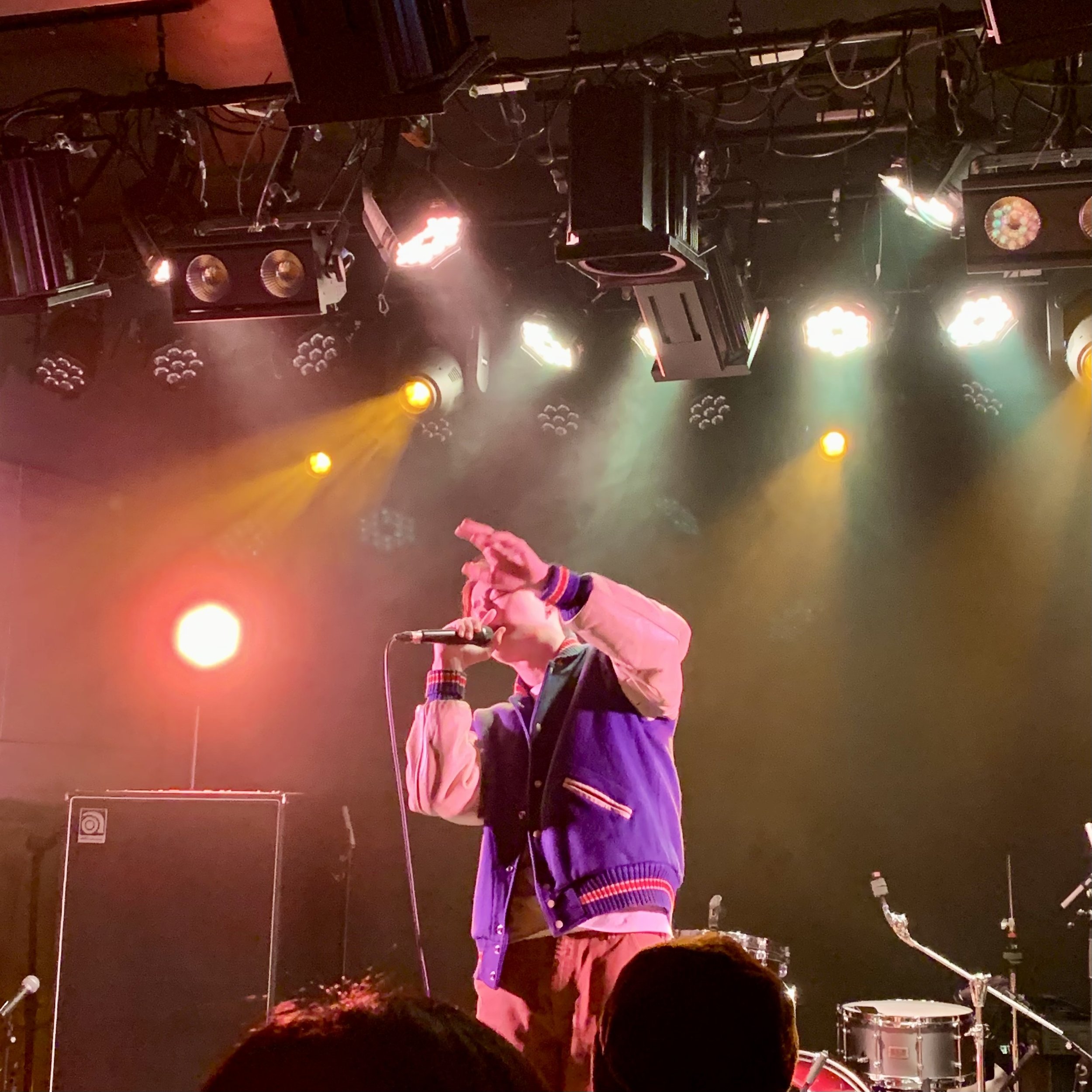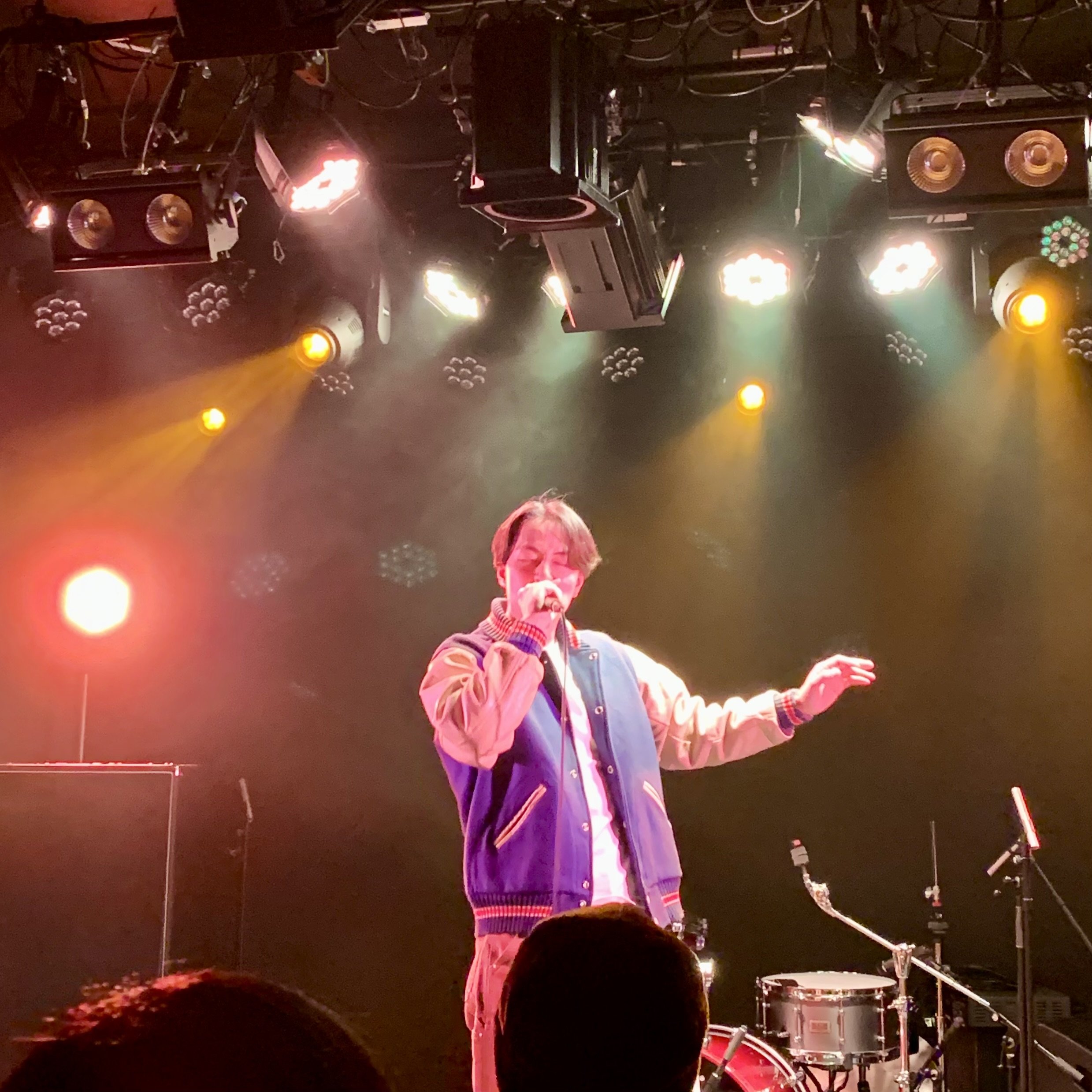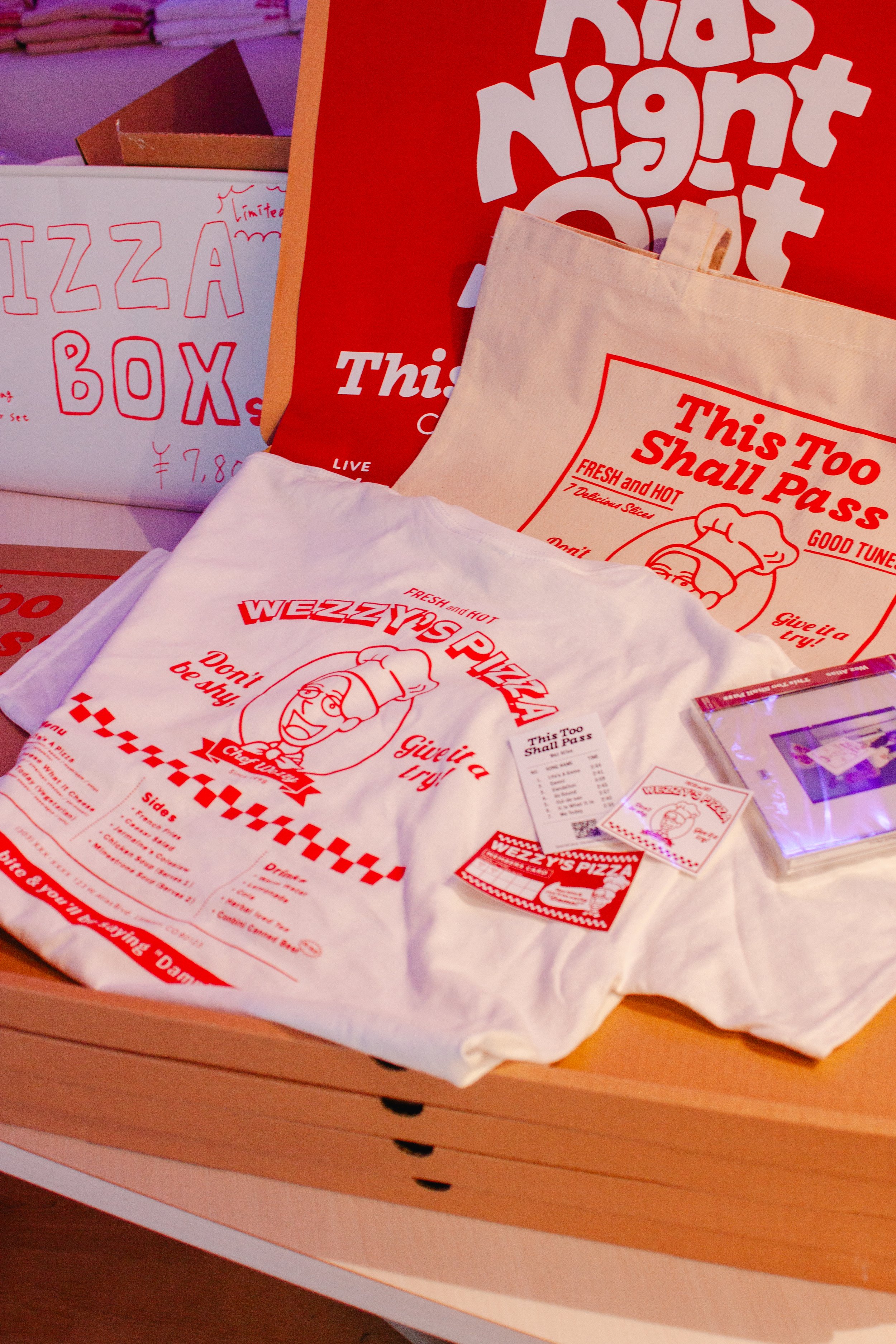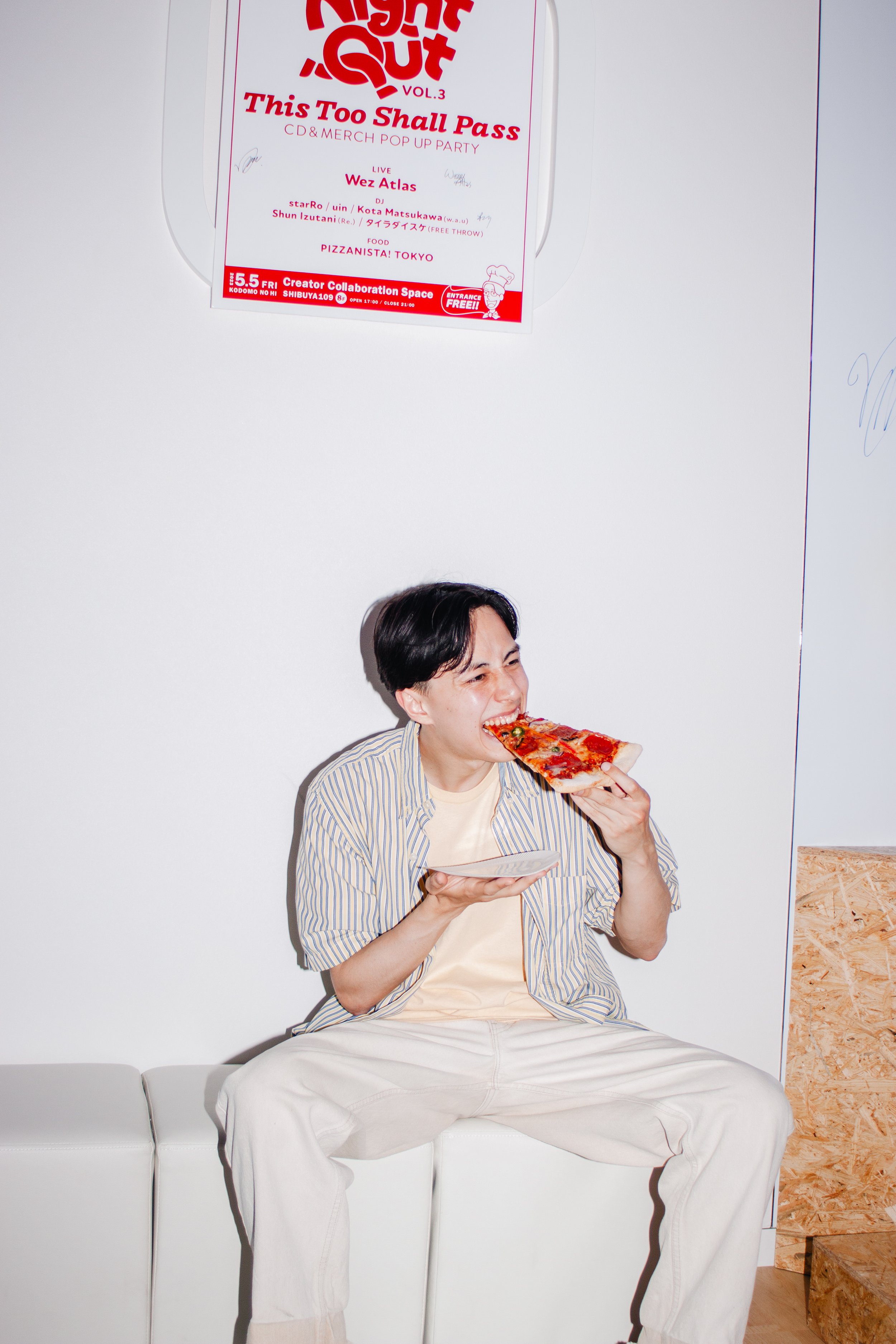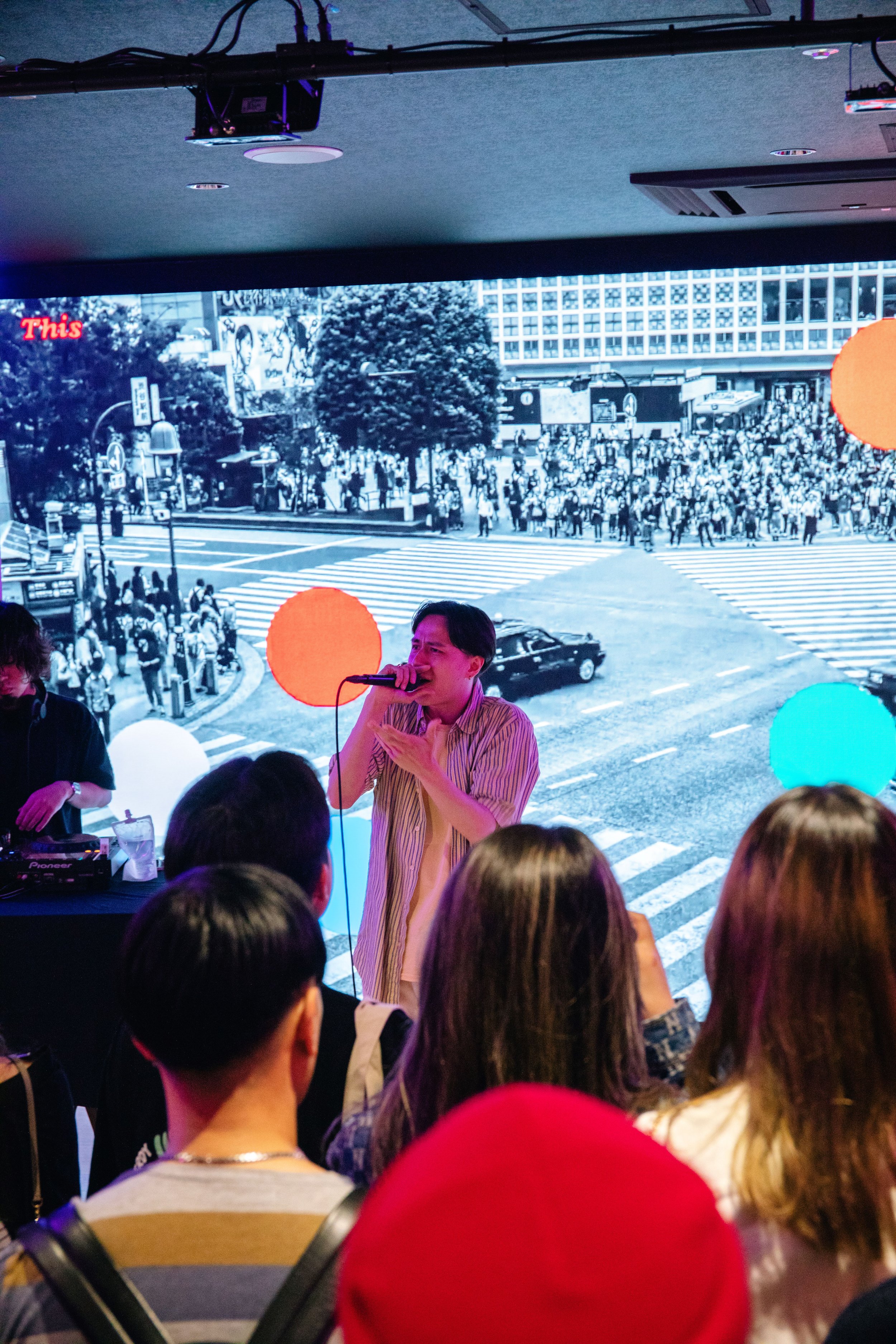It Is What It Is - Interview with Wez Atlas
From Oita to Colorado and now weaving through the chaos of Tokyo, bilingual rapper Wez Atlas combines an international background with the everyday hustle of Japan, telling insightful, personal stories which resonate naturally with ordinary folks. Following the release of his second mini EP “This Too Shall Pass”, Royce Leong of Tokyo ON catches up with Wez to find out what made him the me he is today.
<Introduction>
Tokyo ON: You’ve had quite a few gigs lately, you had the Kids Night Out event, the Sasazuka Bowl, Kobe Mellow Cruise, which is different to the pandemic era. Back then there would have been nothing, and it's all happening now right?
Wez Atlas: I think this is the most active (I’ve been). Last year was a pretty good year as well actually, I did a lot of features, I performed regularly, several times a month, but it’s really kicking off this year.
TO: How does it feel? Is it good to be busy? Is it tiring?
WA: To be honest I’m busy but I’m not that busy, I perform once a week or once in a while, and on that day I’m fully booked, but besides that it’s more like finding inspiration every day, a lot of input, it’s not like I’m super locked in every day, it’s more focused at times. I’m doing alright.
TO: When you mentioned the input, is that for future tracks, like you’re always looking for a story or idea?
WA: I’m reading this book right now by Rick Rubin: “The Creative Act: A Way of Being”, this is telling me that every day you gotta keep your antenna open, you always have to be ready to absorb whatever the universe throws at you. Waking up with a certain kind of mindset…if you’re not thinking about it, or clearing your head of mundane things, Instagram, TikTok whatever, it leaves not enough space for new ideas to come in. So in the morning, I meditate, I hop into an ice bath, that type of thing in the morning to set my intention, and then stay alert all day.
TO: Is this something that’s more recent, because your career is starting to take off?
WA: Oh I’ve always been doing this, it started with these morning pages that I did, I started that during the pandemic, where I’d just get up and write 3 pages of just random things. This is from another book called The Artist’s Way by Julia Cameron. J Cole talked about it, and I just had to get it (laughs). That was my first introduction into the creative way of being, so I’ve been doing it for a while.
TO: It sounds like you’re really focusing on being an artist, sharpening your skills.
WA: Yeah sharpening my skills and keeping my antenna on everyday. I didn’t really know what life would be like as a full time rapper, but now that I’m doing it, I’m like, “Oh this is so dope! This is fun!”
<Artist journey>
TO: You were born in Oita but moved to Colorado when you were 7. Do you remember how you felt moving from Japan to America? What was your impression of America as a kid?
WA: Honestly I don’t remember much about when I moved. I adapted quick, and before I knew it I felt just like an American kid. I do remember Halloween being a huge culture shock though. I didn’t really eat a lot of candy and chocolate growing up in Oita, so when Halloween came around in Colorado I went crazy and ate so much candy I got my first cavity. My mom was a dental hygienist back in the day so you can imagine her disappointment haha.
TO: You then moved back to Japan when you were 15. Did you experience a kind of reverse culture shock? Was it hard to adjust?
WA: Definitely a reverse culture shock. By the time I was 15 I really felt American, so when I moved to Tokyo and entered a Japanese high school, it felt like a whole different world. It wasn’t hard to adjust though, I loved it. All of the stuff I’d seen in anime like school uniforms and sports and bunkasai* and stuff, I became engrossed in it.
*bunkasai: Cultural festivals held in schools featuring demonstrations of sports and arts by students
TO: How do you think that international background shaped your music?
WA: I mean like, 95% of my influences are from the US or other parts of the world so you can say it shaped my music completely.
TO: How did you get into rap and hip hop?
WA: My mom used to have Black Eyed Peas and Sean Paul CDs and we’d listen to them all the time in the car in Oita, so that was my first interaction with the genre. Then once we moved to the States we found the hip hop radio stations and listened to them all day.
TO: Who are your favorite rappers and what inspiration did you draw from them?
WA: J. Cole is my OG. 2014 Forest Hills Drive is like my bible when it comes to hip hop. I heard that album and really felt the power of music and story-telling, and that planted a seed in my mind to eventually start writing my own songs.
TO: Did it come easy to you when you started?
WA: I never really had to force myself to write. It felt like I needed to write, I had a lot of stuff to get off my chest. Towards the end of high school, going through awkward stages of going into adulthood, a lot of different frustrations, and that came out a lot. That part came pretty naturally. But also there’s a thing I used to do growing up, which was my mom’s influence, she would tell me to write a couple of sentences at the end of the day, to reflect on the day. And I did that for a long time, and I still have all these notebooks. That definitely influenced the type of writing that I do now, because it’s all self reflective. That was a big thing. During middle school was when I did it the most.
TO: Was it easy to transition from journaling and writing about your own thoughts and reflections into lyrics?
WA: Yeah, it was really fun, I liked rhyming. And always listening to rap, I had a sense of how to do it from the beginning. This was after I graduated high school actually. I started writing verses over the summer and when I got to college I met some friends that were making music and uploading it to SoundCloud, so I followed suit.
TO: These friends, you’re referring to your Solgasa crew?
WA: Yeah Michel Ko and Tommi Crane, we went to college together, and that’s where we kind of got the idea for Solgasa, and just putting songs on Soundcloud and sharing each other’s links. That environment was so nice to have, because I’ve talked to people who are just starting out and they’re like “I can’t find anyone to make music with!” Especially after COVID, it’s harder to connect and find a community, so I’m pretty happy I had that. Once COVID hit, everyone was just making stuff at home and putting it up on the internet, but it’s different from meeting up with people and hopping in a studio together. And also to build a fan base, of course you can utilize social media, but having a physical place that you can be and gather attention from people around that, like the community, seems like it was much easier to do that pre-COVID.
TO: And that really helped having like-minded people starting out and making tracks at the same time?
WA: Yeah. And just having people come to events. It mostly started with these little college events, and that was important for us to get that first bit of exposure.
TO: Are these songs still available on Soundcloud?
WA: No (laughs), no way. But you have to have a time where you don’t care what other people think and you’re just having fun. That’s another thing that I see some younger artists struggling with. There’s more platforms now where you can get playlisted really early on, like your first ever single can get playlisted on Spotify and get good numbers, but if you start getting that right away, the pressure builds up and I see some kids struggling with that because they got pretty early recognition, they don’t really have time to play around and explore. They already feel like they have to cater to the people that were listening to the first song. I feel like we had this kind of bubble where we really didn’t care.
TO: Do you feel lucky that it happened that way?
WA: Yeah I feel super lucky, I was able to play around first. Because I did start quite late, around 18-19 years old, in the rap-o-sphere I’m a late bloomer, but it was really condensed those first couple of years where I was playing around a lot, and I was able to really speed up that process. I’m glad I got through that, and now I’m pretty confident with everything I put out.
<About the New EP>
TO: Your latest EP is titled This Too Shall Pass. It’s a famous phrase with multiple interpretations - what does it mean to you?
WA: I found it off this clip of actors, a roundtable of legendary actors like Tom Hanks, Jamie Foxx, Shia LaBeouf, Robert DeNiro, and at the end of the interview, they asked “what's one thing you would want to tell your younger self”, and Tom Hanks said “this too shall pass”. And he said something like you feel pissed off right now, you feel angry? This too shall pass. Or you feel like you’re on top of the world, and nothing can bring you down? This too shall pass. So it’s to bring yourself back to a balanced state, because in our day to day, you have a lot of ups and downs, life is unstable still, you’re trying to figure things out and you feel frustrated that things don't move as quick as you want them to. That phrase gave me a lot of peace, it helped me personally because I was like “damn, that’s true” and it made things way easier for me, like “It is what it is”, that type of thing. Because the previous project, “Chicken Soup for One” is like me before I found that type of peace, “Chicken Soup” is just me expressing all those frustrations without really a remedy for it. This EP is two years after that, so I’ve grown more, and I’ve learned to deal with that type of frustration, and the title just summarizes that growth.
TO: Those phrases “This Too Shall Pass” and “It is What it is”, they’re great phrases for everybody.
WA: Especially nowadays, everything you see everyday on social media makes you feel like you’re always falling behind, that there’s always someone doing something better than you, someone a bit further ahead than you. A lot of people feel rushed or behind I think, so these phrases are especially necessary now.
TO: Life’s A Game feels like a motivational song, a way to get hyped (and maybe a song for a boxing ring walk). Do you feel like you’re in a fight?
WA: I don’t know if it’s a battle, it’s more fun, it’s like a game right? Like I’m playing Grand Theft Auto or something, or someone’s playing me and we’re inside the Matrix. It’s fun to think that way, it makes things way more light, instead of “Oh my god, I’m not making enough money, my health isn't good”, if you just pretend you’re in a video game, it’s like “Ok i need to get more coins, how do I get more coins?”, or “I need to find a mission”, or if it’s health then “how do I fix my health bar?”
TO: It’s like you’re gamifying life and that makes it easier to navigate, again is this a way to deal with life being so heavy?
WA: I think so, but Life’s A Game is actually the most positive song within the project, and I put it first for a reason even though I made that song last. But I wanted it to be the intro because I want people to listen to the project and then leave with the feeling that you get from Life’s A Game. And it hypes me up too, just performing it.
TO: From an early stage, it seems like you feel a weight of responsibility. Especially on Damn, you say you “feel the whole weight of the world”, and back in Fun and Games, you mention that “something’s changed”. When did you start feeling like life wasn’t necessarily free or easy?
WA: Life is kind of like an onion, and the layers get peeled back year after year, and the reality that you’re in, breaks once, and then you find out you’re in a bigger reality, and then that breaks…You have tunnel vision as a kid, there’s only a few things in your life that you’re worried about, then you realize there’s more. A big thing is money, you gotta earn money and learn to survive, you got family stuff, relationships, feeling lonely, there’s a lot of things that are unstable and uncertain and you feel like if you’re not working or too idle, you’ll end up homeless or something.
TO: Did you feel like you were pressured, at risk of that kind of thing?
WA: Especially the time when I was making Chicken Soup, my life was at a crossroads of having to do shuukatsu (job hunting) or trying to do music, and obviously music is way riskier, you don’t really hear about people making a comfortable living especially early on, but as you know, (corporate) work life is also pretty difficult. So that felt like a huge decision right there. And also at home, I’m an only child, I feel like I gotta take control and be the big guy. Because I grew up in a single mother household, so there’s that pressure as well.
TO: And then in It is What It Is, you start the song saying “I used to want to never grow up cos adulthood sucks”, and on Cul-de-sac you say you wish you were a kid again back in Littleton. How did you learn to accept or cope with growing up?
WA: I think Life’s A Game is the moment I was accepting the fact, and looking forward to being an adult. Until that point it was really like “I don’t want to do all this shit, I don’t want to have to think about all this new stuff, I just want to play around” And then something just switched in my mind and I was like “you know what, maybe it might be fun, it might be cool to see how far I can go, and how good I can make my life” And I think it just naturally happened over graduating college, starting to do more gigs, my girlfriend is in the corporate world, so talking to her and seeing what life is like on that side…I think now I feel really chill, i feel mostly positive and excited every day.
TO: So when you were rapping about these things, it was in the past before you got to that realization?
WA: Definitely, and it was more like a way to cope, and a way to tell myself it was okay, that it’s okay to not have everything figured out.
TO: About Tokyo, you mention that it’s a city where relaxing ain’t an option, and I love that image of “riding on the JR, weaving through the chaos”. What makes it busy for you, do you feel a kind of pressure living in such a big city?
WA: I’m from a more rural area, Oita, and like people are really friendly, you might just bump into someone and then it’ll start a conversation, it’s that type of place, and i feel like that’s just not the case here, everyone’s on their own mission, they’re headed somewhere. There’s just so many people, you can’t blame them. It’s just that’s what a big city is like, but it gets pretty stressful and it drains your soul, and you start to feel not human after a while.
We just dropped the “Me Today” music video, and we went back to Oita and visited some of the natural locations and it was really nice to get away from Tokyo for just a couple of days.
TO: You look sharp in a suit in the Damn! music video though. Do you think you could ever be a salaryman in Tokyo?
WA: I don’t think I could. I probably would have tried really hard, and then after a couple of years i might have said “I can’t do this”. I think I’m just kind of meant for this career path, there’s a lot of things early on in my life that nudged me in this direction. Just that in college, everyone around me was doing job hunting, so I felt like I had to do it too. I didn’t properly do it even, I went to one seminar, and I was like…nah, can’t do it.
But being a musician also has its own struggles. When you’re emotionally attached to your job, when you’re making something creative, you have to think about it 24/7, it never leaves your mind. Whereas if you can look at your job objectively, you crush your tasks and you meet your quota, and maybe when work ends you can detach from it. So I think there’s pros and cons.
TO: On Go Round you question the way things are: “Is there enough to go round? Are there losers and winners? Are some of us meant to fall down?” Are you referring to any specific social issues like the environment or inequality? What weighs on your mind?
WA: Generally, I feel like in the world there’s winners and losers, and I started to question that. I started to notice little things…for some people it just doesn’t work out, and I've seen a lot of unfortunate cases. And then for other people things do work out. On inequality, I’ve had really rich friends, and really poor friends, and I was on the poor end of the spectrum growing up. It was really interesting to see the whole range of possibilities. And just in the music industry, there’s a lot of aspiring musicians around me, and you see the ones that just fizzle out, and then you see the ones that keep going. We like to think that it’s all up to you, and you make your own way, but sometimes it’s not like that.
TO: Do you feel like there’s a lot of luck involved?
WA: Yeah definitely. I’m very blessed to have this optimistic mindset, and having a belief that everything will work out. Which is the opposite of what I’m saying in Go Round! But in general I do have this kind of sense that it’ll be ok, it’ll work out, and that’s 100% attributed to the way my mom raised me.
TO: You mention your mom a few times in your music, and I presume Cul-de-sac is about her. How has she impacted your life and music?
WA: Everything just from the taste in music, and the approach to life in general. She’s been a huge influence. She’s not very Japanese in a lot of ways, she doesn’t conform to the norm, she hates trying to fit in and wants to do her own thing. That can make your life more difficult, to have this fire burning, especially with human relationships or work culture where you have to fit in. In Japan there’s a saying that the nail that sticks out has to be hammered down.
My actual name is Rei, and the kanji for that originates from a musician for the gods or emperor, and essentially she named me that because she wanted me to do something I loved, to make others happy. That’s what I’m doing now, it’s pretty crazy.
TO: On Me Today, it sounds like you find it hard to keep up with everyone, that you need your own time. Is it hard for you to call a timeout or tell people around you “hey I’m not feeling it today”?
WA: I had a hard time declining invitations to things, in general I was a people pleaser. I’d say “Yeah man let’s do it, let’s link up! Let’s go!” even though I didn't want to go. Nowadays I’m getting a lot better at it and I’m making sure that I get the time I need to rest and get my peace, then I can go out and interact with people again.
And also in music, you see people that are grinding, you always hear about guys who are like, “Yeah man I like 3 beats a day” or “I make 1 song a week”. I can’t do that! It was me telling myself it was okay, to not be like those guys.
TO: These days it seems like everyone needs some time to take care of themselves. Did you intend Me Today to also be a message to others?
WA: Definitely. It feels unnatural to directly point a message at the audience like “you should take care of yourself”, so that’s why I like to say “I’m going to do it” so that when you’re listening, you might be like “I’m gonna do that too”. It’s not on attack mode. I’m just like, “Well this is me, and this is my life” so you can use it as a reference point.
Especially there’s this divide in our generation and our parents' generation, back then it was like you have to grind, which was probably fitting for that time, but now, it seems that people have seen the effects of doing that for 20-30 years, and them struggling with a lot of things, and young people are like, “Wait I don’t want to end up like that, so I’m gonna take care of myself a little more and take things at a slower pace”. And that will probably help you down the line and have longevity in any career you're pursuing, or be happier and healthier later on.
<About production and working with others>
TO: You’ve also done a bunch of collaborations with a very diverse list of artists and bands ranging from Miida and the Department and Helsinki Lambda Club to mashinomi/80 Kidz, Rie Morris, and MoMo. Did you seek them out specifically or do they tend to approach you first? Tell us about how some of these collabs came about.
WA: They usually reach out to me, and say “yo you wanna hop on this song?” and i’m like “of course, hell yeah! Why not!”
TO: Your door is always open then?
WA: Now I’m going into a phase where I’m a bit more selective, and trying to really solidify my brand. But for the past few years, it’s probably most beneficial now to just explore as much as you can before people are really paying attention, so you can figure out what your lane is. So that’s why I was never hesitant to accept an offer.
TO: Put another way, you don’t seem to have a fixed musical style, your rapping goes over almost anything as opposed to belonging to a specific genre like g-funk or trap. Is that just natural (because of the artists and producers you work with) or is that by choice? Do you have a preferred sound, or if there’s a beat you’ll just jump on it and go with it?
WA: That was probably the vibe up until now, but as you learn more about the industry, it seems people are really thoughtful with each decision they make. Up until this point, if they wanted me on a song, I was flattered, of course I’d want to do it. I grew up mostly listening to pop music, rap, but pop leaning, so that’s why I’m familiar with a lot of different genres, so I can figure out my approach to it.
TO: Is there a sort of direction you want to go from here?
WA: I never thought about it until now, but when I talk to guys like VivaOla and Kota Matsukawa, who come from the production side of music, they opened up my eyes to their perspective. Things I was doing without thinking, I realize there’s theory about it, I have tendencies, so learning about my own tendencies and tastes helps me make my sound the way I want it to. That’s the next step. Right now it’s just Matsukawa and I. I worked with a lot of producers for the last two projects, and that was good because it brought a lot of different sides out of me, but I want to do something more cohesive next. I feel like that’s what was missing, and that will probably propel me to the next stage.
<Looking ahead>
TO: You recently performed at SXSW, what was that like?
WA: That was amazing, that was an eye opening experience. I didn’t do my best. I think I could have put on a better show, but it was a good learning experience. The biggest thing is just interacting with Americans for the first time in a while, I kind of forgot what it was like. It helped me visualize what type of music would hit that type of demographic, or what kind of day to day struggles they’re going through. I was in this Tokyo bubble, and just hopping out once for 10 days made me realize a lot of things.
TO: So when is THE album coming out?
WA: It’s not in the works yet, but it’s on the horizon. Because I think that first full length album, that debut album, it’s an important one and there’s a lot of pressure on that, so I want to make sure it’s the right time, I’m at the right stage. I feel like I still have a lot to improve upon before I get to that. I want to make it memorable, something that will stand the test of time.
TO: That’s a high bar to set, but that’s good! We’re looking forward to it!
And finally, would you ever be interested in starting up a Wezzy’s Pizza franchise? You already got a name, logo, and marketing copy, you’re halfway there!
WA: That’d be dope actually! But I dunno, I did chicken soup for my first project, I did pizza for this one, it might be sushi on the next one…Sometimes I think I want to have a bar/live venue, that’d be cool, a place where people can get together, that might be fun.
TO: We will be first in line for that for sure. Thanks for your time and we’ll see you around!
Wez Atlas’s latest EP “This Too Shall Pass” is now available on major streaming platforms, in store and on vinyl. Make sure to keep up with him on Instagram, Twitter, and YouTube, and check out the shop for goods and more.

